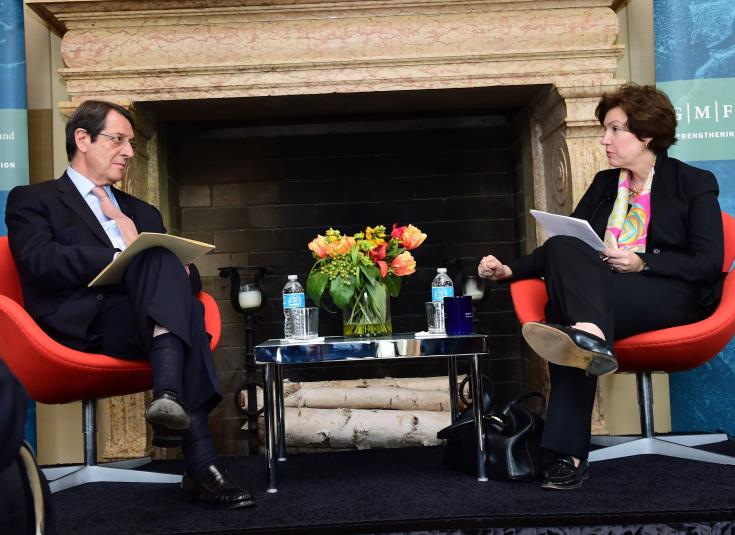President stresses the importance of a Cyprus solution for regional and international relations
CNA – Apostolis Zoupaniotis – Washington 07/06/2017 21:28
A re-united Cyprus, with an independent foreign policy, will prove of great value for regional stability, development of the EU–Turkey relations, including its security dimension, as well as Greco-Turkish relations, Cyprus President Nicos Anastasiades has said, speaking at a German Marshall Fund’s event in Washington on the challenges and prospects in Eastern Mediterranean.
“No one is served if Cyprus ceases to act as an independent, reliable actor and becomes a proxy of an unpredictable Turkey in a post-settlement arrangement,”, the President stressed.
The US and wider western interests would be damaged if Cyprus were to become a third-country’s proxy and act as an extension of its foreign policy, he said. That, he added, would also damage efforts for greater regional cooperation among the states in the East Mediterranean.
“I wish to stress the importance of a settlement that will on the one hand ensure the viability of the state, the fundamental freedoms and human rights of all its citizens, and on the other hand, that will allow Cyprus to remain the reliable, stable regional partner of the West in the region”, he pointed out.
At the same time, he noted that at the current stage in the UN-facilitated peace negotiations, to reunite Cyprus, Turkey’s contribution in concrete terms is indispensable, particularly in the discussion of two crucial chapters – security and guarantees.
Anastasiades also stressed the role Cyprus has played in building trilateral cooperation mechanisms in its region, with key players such as Israel, Egypt, Jordan and Lebanon – and Greece.
As he said the common denominator for the countries that participate in these cooperation mechanisms is the understanding that these arrangements could serve as a model of regional dialogue, contributing to the consolidation of peace, stability and prosperity but also as a tool for achieving greater understanding and cooperation.
The President referred to the discovery of hydrocarbon reserves in the Eastern Mediterranean, which in many ways has eased the formation of the trilateral cooperation mechanisms. He added that the discovery and exploitation of energy reserves in the Eastern Mediterranean also holds the potential of strengthening the EU’s energy security, a vital interest for both the European Union and the United States.
Anastasiades stressed that Cyprus’ geopolitical value lies in its bridging role in fostering peace and cooperation in a volatile region and the country is active, reliable partner in the areas of combating terrorism, fighting the proliferation of weapons of mass destruction and providing humanitarian assistance.
Replying later to relevant questions, the President said he has presented a comprehensive proposal to address the concerns of the Turkish Cypriots, suggesting a multinational force, a federal police force, a role for the UN Security Council and the EU, but also safeguards for political equality and the distribution of power.
“No one can trust the presence of Turkish troops on the island,” he said.
Replying to a question about NATO, he said that despite the government`s wish, the majority of Cypriots do not want NATO membership. The President admitted that it would be much more helpful for Cyprus to be a NATO member, however, he said that he respects the desire of the people who want to stay out of military alliances.
In a question about the aftermath of Turkey’s referendum, the President expressed the view that because of the 2019 elections, Turkish President Tayip Erdogan might need the support of the nationalists.
He wished that Turkey in the proposed Geneva talks in June will surprise him pleasantly.
The solution of the Cyprus problem is also in the interest of the United States as it will normalize relations between its two partners in NATO, Greece and Turkey, but will also be an example of peaceful coexistence between Christians and Muslims, he pointed out.
He added that he would discuss the issue tomorrow with US Vice President Mike Pence and said that he believes that the US can do much more.
The UN announced on Monday, following a dinner which President Anastasiades and Turkish Cypriot leader Mustafa Akinci had with Guterres, that “the leaders and the Secretary-General agreed on the need to reconvene the Conference on Cyprus in June in line with the 12 January statement of the Conference.”
Guterres said in a statement he read out to the press after the dinner, that all agreed that the chapter on security and guarantees is of vital importance to the two communities and that “progress in this chapter is an essential element in reaching an overall agreement and in building trust between the two communities in relation to their future security.”
He also noted that Eide will engage with all participants in the preparation of a common document to guide the discussions on security and guarantees, based on the outcome of the meetings of the Conference on Cyprus in Geneva and Mont Pelerin.
Cyprus has been divided since 1974, when Turkish troops invaded and occupied 37% of its territory. Anastasiades and Akinci have been engaged in UN-led talks since May 2015 with a view to reunite the island under a federal roof.
CNA/AZ/TNE/MM/2017
ENDS, CYPRUS NEWS AGENCY

